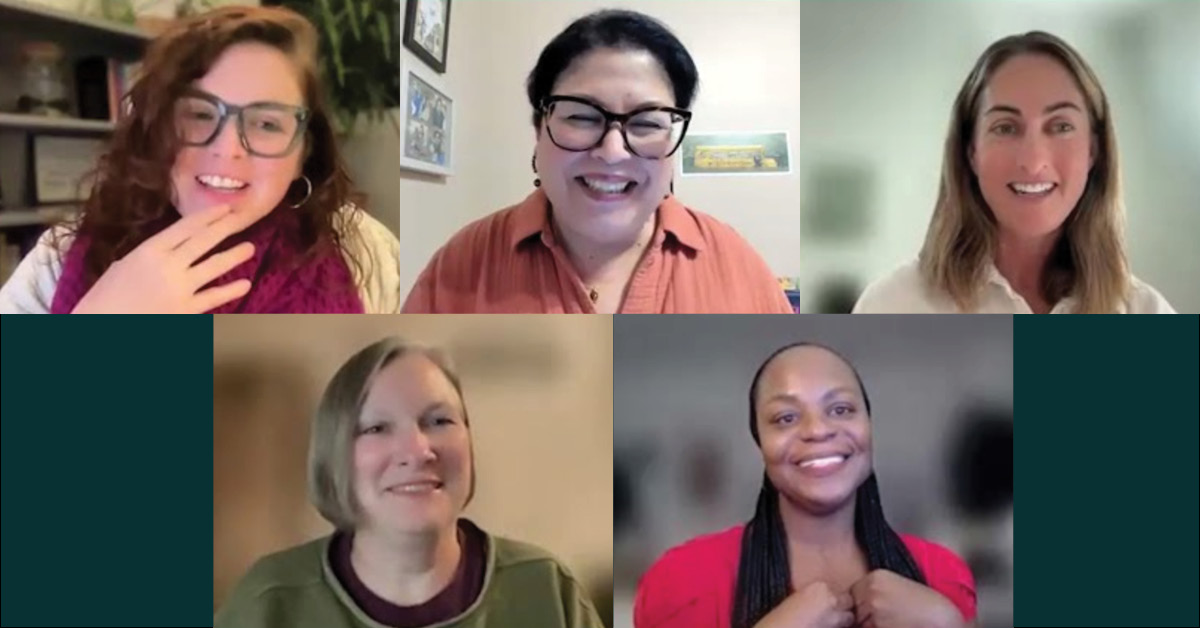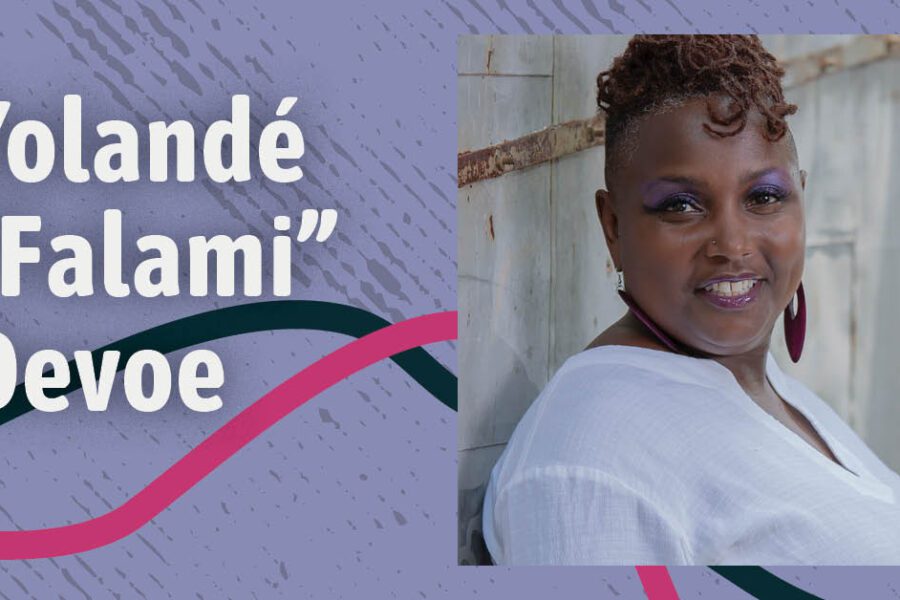As part of the Antioch Works for Democracy initiative, five librarians recently came together to hold a virtual panel discussion about today’s threats to intellectual freedom, the rising number of book bannings, and the importance for school librarians to act ethically and strategically to support their students. This event, “Celebrating the Freedom to Read: Book Banning, Censorship, and Democracy,” was jointly hosted by Antioch University and the American Association of School Librarians (AASL) on September 24, 2024. It brought together a diverse group of library professionals to discuss the intersections of book banning, censorship, and the role of libraries in upholding democracy.
The panel featured participants with a wide range of connections to the issues facing school librarians: Antioch education faculty members Jen Sturge and Miranda Doyle, University of Baltimore librarian Allison Jennings-Roche, middle school librarian Sheri Massey, and District Library Coordinator Becky Calzada, who moderated the event. Calzada is the current president of the American Association of School Librarians.
Calzada guided the conversation through complex issues surrounding censorship and democracy, initiating discussions on recent trends in book banning across the country, including a deep dive into the ways that schools and libraries are increasingly serving as battlegrounds for ideological conflicts.
Maintaining Neutrality and Diversity in the Stacks
Censorship is not a new phenomenon, noted Jennings-Roche, the University of Baltimore librarian. Rather, it has often been a reaction to progressive social change. The current wave of censorship, however, stands out as part of a coordinated global shift toward authoritarianism, where book bans serve as a tool to dictate which voices are heard and which ideas are suppressed. She pointed out a troubling trend: backlash against librarians simply for doing their jobs. This unprecedented situation reflects broader efforts to undermine public education and erode trust in public institutions. Jennings-Roche said that many of the censorship efforts seen today in public education come from external forces, such as well-funded coalitions with a mission to control public education. As she put it, “Book bans are often a lever.”
Panelists reflected on specific instances where books were challenged or banned. Doyle—who, in addition to teaching as adjunct faculty at Antioch University, serves as librarian for the Southern Oregon Education Services District—recounted the emotional toll book challenges can take on librarians, who often receive complaints from parents or community members about specific books. Some libraries and schools have policies that can guide a conversation about a challenged book, but not all school staff know what the policies are or where to escalate the problem when approached. Additionally, school boards do not always follow their written policies—or even know what they are.
The panelists collectively underscored that libraries must continue to stand as advocates for intellectual freedom and that librarians and other paraprofessionals who work in schools need to be taught what policies are in place so that they know how to handle questions and challenges from members of the public.
Historically, libraries have prided themselves on balanced programming, book selection, and representation. Maintaining neutrality allows libraries to serve diverse communities, the panelists noted, but can also limit their ability to effectively respond to coordinated attacks from outside political groups that aim to radicalize communities through misinformation.
Calzada emphasized the emotional toll this wave of censorship takes on library workers, noting that the consequences of personal attacks and isolation faced by librarians, especially in smaller communities, can result in self-censorship. Librarians have started to question their choices and approach to avoid potential challenges.
The panel also acknowledged political pushback against censorship, citing Maryland’s recent “Freedom to Read” legislation as a positive step toward protecting librarians from criminalization. This legislation underscores the significance of organizing community voices, including parents, to resist censorship efforts and push back against book bans.
As the conversation continued, it turned toward practical strategies for fostering advocacy and community engagement. Sheri Massey—who in 2023 won the Maryland School Librarian of the Year award—stressed the importance of librarians participating in local and national professional organizations, such as AASL can serve as a vital foundation for advocacy efforts. These organizations provide supportive networks for library workers.
Doyle suggested that non-librarians who wanted to help support their school libraries could take the step of forming parent groups dedicated to defending books and libraries, citing successful examples from Oregon. These parent groups mobilize local voices to combat book challenges and foster a sense of community around the protection of intellectual freedom.
Jennings-Roche added another point of view, bringing up the importance of finding allies on local boards. She encouraged local advocates for intellectual freedom to consider running for the school board or public office. This proactive approach can counteract the pro-book-banning side’s strategy of running for local government. By taking part in local governmental processes, parents and community members can ensure that diverse voices are represented in decision-making processes that affect public education. Panelists also highlighted the critical role of voter participation in local elections. Engaging communities to vote can have significant implications for library funding and governance.
Finding Sources of Hope and Strength
In the latter part of the discussion, the panelists reflected on what gives them hope amid the challenges posed by censorship and book banning. Sturge, who serves as Core Faculty in Antioch’s School of Education, shared an uplifting experience from a recent visit to a high school library, where she witnessed students excitedly selecting books of their choice. This moment served as a reminder of the positive impact libraries have on young people, fostering a love for reading and encouraging critical thinking. The panelists agreed that they see encouraging trends among younger voters, who are increasingly engaged and registering to vote in record numbers. They expressed optimism that if this momentum continues, it could herald a brighter future for democracy and the protection of intellectual freedom.
Calzada shared insights about the ongoing lawsuits filed to protect intellectual freedom and access to information. With the backing of organizations like the Freedom to Read Foundation, there is a collective effort to defend libraries and uphold the principles of democracy.
Massey emphasized the importance of maintaining a balanced perspective in advocacy efforts, urging librarians to take action while celebrating the moments of joy that libraries create in their communities. Documenting these positive experiences can serve as a motivational tool during challenging times, reminding librarians of their vital role in fostering intellectual freedom.
The Vital Role of Libraries in Promoting Democracy
Throughout the evening, the conversation highlighted the pivotal role libraries play in supporting democracy. Libraries, the panelists agreed, are not just repositories of books—they are vibrant community hubs that foster critical thinking, inclusivity, and civic engagement. Libraries must remain steadfast in their commitment to offering diverse collections and programming that reflect the multifaceted nature of our society.
Jennings-Roche proposed several strategies for combating censorship, including approaching parents to run for school boards, proactive collection development policies, and community outreach initiatives that engage local members in protecting intellectual freedom and the value of diverse literature.
The panel illuminated the pressing challenges facing libraries today while celebrating the resilience and commitment of librarians to advocate for intellectual freedom. As the threats of censorship and book banning increase, the voices of librarians, educators, and community members are more critical than ever. By fostering community engagement, supporting one another, and advocating for intellectual freedom policies within local communities, the education system can work toward a future where the freedom to read is celebrated and protected for all.
The panel was co-sponsored by Antioch Works for Democracy, a year-long campaign of pro-democracy action being put on by Antioch University, and by the AASL, the only national professional membership organization focused on school librarians and the school library community. AASL has more than 7,000 members and serves school librarians in the United States, Canada, and around the world.






